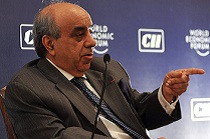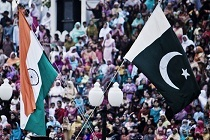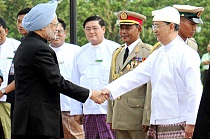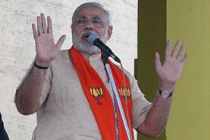 Courtesy: World Economic Forum/Flickr
Courtesy: World Economic Forum/Flickr
For the first time since 1947, Pakistan, on May 11, succeeded in transitioning from one elected government to another. Gateway House interviews Arun Nanda, Director, Mahindra Group, on the prospects of India-Pakistan trade in the new political environment.
 Courtesy: Peter Fuchs/Flickr
Courtesy: Peter Fuchs/Flickr
The similarities between China’s ascent in the global arena and India’s rise in 2003 are striking. Manjeet Kripalani blogs about why despite their remarkable rise, it is in Beijing’s interest to take notes from the stagnation that followed India’s growth.
 Courtesy: WikimediaCommons/Flickr
Courtesy: WikimediaCommons/Flickr
The road to reconciliation between India and Pakistan is likely to be a long and treacherous one. But perhaps economic compulsions can overtake political ones. That is the hope in Karachi, whose business community has started to make its journey across the border to India.
 Courtesy: Ministry Of External Affairs, India
Courtesy: Ministry Of External Affairs, India
As a neighbour, India has legitimate interests in Myanmar, especially for peace and progress in its North East. More recently though, the Myanmarese are looking to imbibe democratic values from India, learn about regulations, banking systems, commodities exchanges, media councils, software and telecom skills
Courtesy: Nilanjana Roy/WikimediaCommons
India’s governance and newest social revolution, led by the country’s youth and middle class, is being watched by the world. But will the incumbent government be able to respond with emotion and convert the movement into tangible policies and institutionalise them? Manjeet Kripalani blogs
 Courtesy: Satish Padmanabhan/Outlook
Courtesy: Satish Padmanabhan/Outlook
Narendra Modi, the chief minister of Gujarat, returned to office for an unprecedented fourth term. With this victory, the fate of India’s two national political parties has changed, and the battles within and without will play out over next few months leading up to the national elections in 2014.
Courtesy: World Economic Forum/Flickr
The World Economic Forum on India projected a grim reality with corporates wearing the Non-Resident Indian cloak and reprimanding the government for its policies. After participating in a panel at the Forum, Manjeet Kripalani gives her account of the WEF and the need for new heroes to take charge in India.
Manjeet Kripalani, Executive Director, Gateway House blogs about the hurdles social entrepreneurs in India face and the alluring idea of an India-South East Asia Social Enterprise Corridor.
 Courtesy:
Courtesy:
Gateway House's Co-founder Manjeet Kripalani wrote an article in The Financial Times about youth education in India. She argues that India's education system is obsolete and that we must find news ideas on educating Indian youth and preparing them for the workforce.
 Courtesy:
Courtesy:
Gateway House's Director Manjeet Kripalani wrote an article for The Economic Times about the foreign direct investment in India. She explains why companies with foreign direct investment plans in India must change their strategy.









